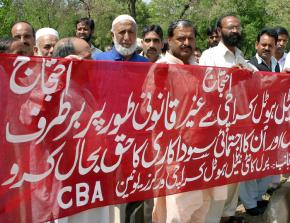Fighting for the union in Pakistan
, a Karachi-based writer who blogs at The Mob and the Multitude, reports on the struggle of hotel workers near Islamabad facing an anti-union attack.
HOTEL WORKERS from a five-star hotel in Rawalpindi near Islamabad are on a hunger strike entering its third week after the hotel management summarily fired 350 employees and rejected negotiations with the workers' union. The Hashoo group, which owns the Pearl Continental Hotel (PC), refuses to recognize the union even though it is legally recognized by Pakistan's courts.
Union representative Ghulam Mehboob said that that the "health of several workers wasn't good" following the hunger strike. Eleven protesters, including union president Sher Ahmed, have been taken to the hospital.
The central issue is the conversion of temporary employees, who comprise a significant share of the PC workforce, into permanent workers.
The PC union's charter of demands, a standard document submitted annually by a union to its employer, included a request to turn these workers--most of whom have worked at the PC for at least seven years--into permanent workers, making them eligible for pay raises and benefits. These workers are currently only paid an average of 10,000 rupees (about $120) per month.

Following tense negotiations, PC's Human Resources Director Major Nadeem agreed to the demand--only to be promptly fired by the hotel. His successor, Colonel Zulfikar, declared his refusal to negotiate with the union at the employees' teatime gathering. "A few people began to raise slogans then and there," says Mehboob.
Perhaps fearing that workers would occupy the hotel as had happened in the PC's Karachi branch three months earlier, the hotel management called in an estimated 250 policemen and the District Coordination Officer. They reportedly told the workers that the hotel was being "sealed." Employees were immediately kicked off the premises and subsequently fired. Most of those sacked are classified as temporary labor.
THESE EVENTS are the latest chapter in the Hashoo Group's long history of exploitative labor practices. Earlier this year, workers occupied the basement of the PC Karachi after union activists were fired and their demands went unmet. That struggle ended when the PC conceded and hired back the workers.
As early as 2001, the Hashoo Group had begun cutting salaries and pension funds and firing workers who protested. In fact, the hotel's labor practices have been so exploitative that they have been condemned by the UN's International Labor Organization (ILO). An investigation by the organization concluded that "grave violations of union rights had been committed by the hotel management and local authorities." The ILO called on the government to conduct a thorough investigation.
The hotel's policies are part of a growing trend in Pakistan, one that has led to increased inequality between the working poor and Westernized elites. At the same moment that the World Food Program is warning of deepening food security in the country, Pakistan has had its first entry in the most recent Forbes magazine list of the world's billionaires.
The Hashoo Group has now also filed charges against 120 of the fired employees accusing them of attempting to burn down the hotel. For the workers, none of this is new. Management has used this tactic before against union activists who were locked up for months in a secret prison in Karachi before being acquitted in court.
In addition to demanding the conversion of temporary labor to permanent employees, the protesting workers are demanding their jobs back, fair wages and the return of their pension funds, a significant portion of which the Hashoo Group has reportedly seized.
Although the workers' have set up their protest camp next to Geo television's headquarters in Islamabad, the strike has yet to receive coverage from mainstream media outlets. "They have a hold on everything," says Mehboob, "but we're fighting."


